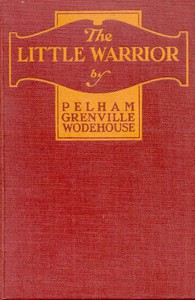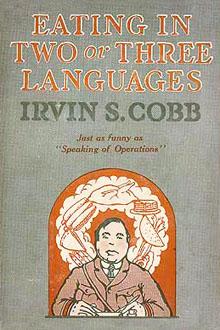The Little Warrior by P. G. Wodehouse (top 50 books to read txt) 📗

- Author: P. G. Wodehouse
Book online «The Little Warrior by P. G. Wodehouse (top 50 books to read txt) 📗». Author P. G. Wodehouse
“He always does,” said the Southern girl. “Some more buckwheat cakes, please. But what about the book?”
“I never listen to the book.”
The Cherub laughed.
“You’re too good to yourself! I listened to it right along and take it from me it’s sad! Of courthe they’ll have it fixed. We can’t open in New York like this. My professional reputation wouldn’t thtand it! Didn’t you thee Wally Mason in front, making notes? They’ve got him down to do the rewriting.”
Jill, who had been listening in a dazed way to the conversation, fighting against the waves of sleep which flooded over her, woke up.
“Was Wally—was Mr Mason there?”
“Sure. Sitting at the back.”
Jill couldn’t have said whether she was glad or sorry. She had not seen Wally since that afternoon when they lunched together at the Cosmopolis, and the rush of the final weeks of rehearsals had given her little opportunity for thinking of him. At the back of her mind had been the feeling that sooner or later she would have to think of him, but for two weeks she had been too tired and too busy to re-examine him as a factor in her life. There had been times when the thought of him had been like the sunshine on a winter day, warming her with almost an impersonal glow in moments of depression. And then some sharp, poignant memory of Derek would come to blot him out. She remembered the image she had used to explain Derek to Wally, and the truth of it came home to her more strongly than ever. Whatever Derek might have done, he was in her heart and she could not get him out.
She came out of her thoughts to find that the talk had taken another turn.
“And the wortht of it is,” the Cherub was saying, “we shall rehearthe all day and give a show every night and work ourselves to the bone, and then, when they’re good and ready, they’ll fire one of us!”
“That’s right!” agreed the Southern girl.
“They couldn’t!” Jill cried.
“You wait!” said the Cherub. “They’ll never open in New York with thirteen girls. Ike’s much too thuperstitious.”
“But they wouldn’t do a thing like that after we’ve all worked so hard!”
There was a general burst of sardonic laughter. Jill’s opinion of the chivalry of theatrical managers seemed to be higher than that of her more experienced colleagues. “They’ll do anything,” the Cherub assured her. “You don’t know the half of it, dearie,” scoffed Lois Denham. “You don’t know the half of it!”
“Wait till you’ve been in as many shows as I have,” said Babe, shaking her red locks. “The usual thing is to keep a girl slaving her head off all through the road-tour and then fire her before the New York opening.”
“But it’s a shame! It isn’t fair!”
“If one is expecting to be treated fairly,” said the Duchess with a prolonged yawn, “one should not go into the show-business.”
And, having uttered this profoundly true maxim, she fell asleep again.
The slumber of the Duchess was the signal for a general move. Her somnolence was catching. The restorative effects of the meal were beginning to wear off. There was a call for a chorus-rehearsal at four o’clock, and it seemed the wise move to go to bed and get some sleep while there was time. The Duchess was roused from her dreams by means of a piece of ice from one of the tumblers; checks were paid; and the company poured out, yawning and chattering, into the sunlight of the empty boardwalk.
Jill detached herself from the group, and made her way to a seat facing the ocean. Tiredness had fallen upon her like a leaden weight, crushing all the power out of her limbs, and the thought of walking to the boarding-house where, from motives of economy, she was sharing a room with the Cherub, paralyzed her.
It was a perfect morning, clear and cloudless, with the warm freshness of a day that means to be hotter later on. The sea sparkled in the sun. Little waves broke lazily on the gray sand. Jill closed her eyes, for the brightness of sun and water was trying; and her thoughts went back to what the Cherub had said.
If Wally was really going to rewrite the play, they would be thrown together. She would be obliged to meet him, and she was not sure that she was ready to meet him. Still, he would be somebody to talk to on subjects other than the one eternal topic of the theatre, somebody who belonged to the old life. She had ceased to regard Freddie Rooke in this light: for Freddie, solemn with his new responsibilities as a principal, was the most whole-hearted devotee of “shop” in the company. Freddie nowadays declined to consider any subject for conversation that did not have to do with “The Rose of America” in general and his share in it in particular. Jill had given him up, and he had paired off with Nelly Bryant. The two were inseparable. Jill had taken one or two meals with them, but Freddie’s professional monologues, of which Nelly seemed never to weary, were too much for her. As a result she was now very much alone. There were girls in the company whom she liked, but most of them had their own intimate friends, and she was always conscious of not being really wanted. She was lonely, and, after examining the matter as clearly as her tired mind would allow, she found herself curiously soothed by the thought that Wally would be near to mitigate her loneliness.
She opened her eyes, blinking. Sleep had crept upon her with an insidious suddenness, and she had almost fallen over on the seat. She was just bracing herself to get up and begin the long tramp to the boarding-house, when a voice spoke at her side.
“Hullo! Good morning!”
Jill looked up.
“Hullo, Wally!”
“Surprised to see me?”
“No. Milly Trevor said she had seen you at the rehearsal last night.”
Wally came round the bench and seated himself at her side. His eyes were tired, and his chin dark and bristly.
“Had breakfast?”
“Yes, thanks. Have you?”
“Not yet. How are you feeling?”
“Rather tired.”
“I wonder you’re not dead. I’ve been through a good many dress-rehearsals, but this one was the record. Why they couldn’t have had it comfortably in New York and just have run through the piece without scenery last night, I don’t know, except that in musical comedy it’s etiquette always to do the most inconvenient thing. They know perfectly well that there was no chance of getting the scenery into the theatre till the small hours. You must be worn out. Why aren’t you in bed?”
“I couldn’t face the walk. I suppose I ought to be going, though.”
She half rose, then sank back again. The glitter of the water hypnotized her. She closed her eyes again. She could hear Wally speaking, then his voice grew suddenly faint and far off, and she ceased to fight the delicious drowsiness.
Jill awoke with a start. She opened her eyes, and shut them again at once. The sun was very strong now. It was one of those prematurely warm days of early Spring which have all the languorous heat of late summer. She opened her eyes once more, and found that she was feeling greatly refreshed. She also discovered that her head was resting on Wally’s shoulder.
“Have I been asleep?”
Wally laughed.
“You have been having what you might call a nap.” He massaged his left arm vigorously. “You needed it. Do you feel more rested now?”
“Good gracious! Have I been squashing your poor arm all the time? Why didn’t you move?”
“I was afraid you would fall over. You just shut your eyes and toppled sideways.”
“What’s the time?”
Wally looked at his watch.
“Just on ten.”
“Ten!” Jill was horrified. “Why, I have been giving you cramp for about three hours! You must have had an awful time!”
“Oh, it was all right. I think I dozed off myself. Except that the birds didn’t come and cover us with leaves; it was rather like the ‘Babes in the Wood.’”
“But you haven’t had any breakfast! Aren’t you starving?”
“Well, I’m not saying I wouldn’t spear a fried egg with some vim if it happened to float past. But there’s plenty of time for that. Lots of doctors say you oughtn’t to eat breakfast, and Indian fakirs go without food for days at a time in order to develop their souls. Shall I take you back to wherever you’re staying? You ought to get a proper sleep in bed.”
“Don’t dream of taking me. Go off and have something to eat.”
“Oh, that can wait. I’d like to see you safely home.”
Jill was conscious of a renewed sense of his comfortingness. There was no doubt about it, Wally was different from any other man she had known. She suddenly felt guilty, as if she were obtaining something valuable under false pretences.
“Wally!”
“Hullo?”
“You—you oughtn’t to be so good to me!”
“Nonsense! Where’s the harm in lending a hand—or, rather, an arm—to a pal in trouble?”
“You know what I mean. I can’t … that is to say … it isn’t as though … I mean …”
Wally smiled a tired, friendly smile.
“If you’re trying to say what I think you’re trying to say, don’t! We had all that out two weeks ago. I quite understand the position. You mustn’t worry yourself about it.” He took her arm, and they crossed the boardwalk. “Are we going in the right direction? You lead the way. I know exactly how you feel. We’re old friends, and nothing more. But, as an old friend, I claim the right to behave like an old friend. If an old friend can’t behave like an old friend, how can an old friend behave? And now we’ll rule the whole topic out of the conversation. But perhaps you’re too tired for conversation?”
“Oh, no.”
“Then I will tell you about the sad death of young Mr Pilkington.”
“What!”
“Well, when I say death, I use the word in a loose sense. The human giraffe still breathes, and I imagine, from the speed with which he legged it back to his hotel when we parted, that he still takes nourishment. But really he is dead. His heart is broken. We had a conference after the dress-rehearsal, and our friend Mr Goble told him in no uncertain words—in the whole course of my experience I have never heard words less uncertain—that his damned rotten high-brow false-alarm of a show—I am quoting Mr Goble—would have to be rewritten by alien hands. And these are them! On the right, alien right hand. On the left, alien left hand. Yes, I am the instrument selected for the murder of Pilkington’s artistic aspirations. I’m going to rewrite the show. In fact, I have already rewritten the first act and most of the second. Goble foresaw this contingency and told me to get busy two weeks ago, and I’ve been working hard ever since. We shall start rehearsing the new version tomorrow and open in Baltimore next Monday with practically a different piece. And it’s going to be a pippin, believe me, said our hero modestly. A gang of composers has been working in shifts for two weeks, and, by chucking out nearly all of the original music, we shall have a good score. It means a lot of work for you, I’m afraid. All the business of the numbers will have to be re-arranged.”
“I like work,” said Jill. “But I’m sorry for Mr Pilkington.”
“He’s all right. He owns seventy per cent of the show. He may make a fortune. He’s certain to make a comfortable sum. That is, if he doesn’t sell out his interest in pique—or dudgeon, if you prefer it. From what he said at the close of the proceedings, I fancy he would sell out to anybody who asked him. At least, he said that he washed his hands of the piece. He’s going back to New York this afternoon,—won’t even wait for the opening. Of course, I’m sorry for the poor chap in a way, but he had no right, with the excellent central idea which he got, to turn out such a rotten book. Oh, by the way!”
“Yes?”
“Another tragedy! Unavoidable, but pathetic. Poor old Freddie! He’s out!”
“Oh, no!”
“Out!” repeated Wally firmly.
“But didn’t you think he was good last night?”
“He was awful! But that isn’t why. Goble wanted his part rewritten as a Scotchman, so as to get McAndrew, the fellow who made such a hit last season in ‘Hoots, Mon!’ That sort of thing is always happening in musical comedy. You have to fit parts to suit whatever good people happen to be available at the moment. When you’ve had one or two experiences of changing your Italian count to a Jewish millionaire—invariably against time:





Comments (0)